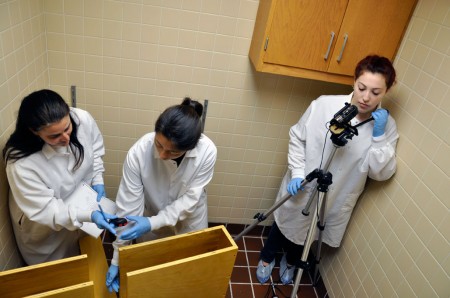This summer, student researchers working in psychology professor Deb Kreiss’ lab are getting a first-hand experience treating their own obsessive-compulsive disorder (OCD) patients — lab rats.
By treating the lab rats so that they behave with OCD-like symptoms, Kreiss and her students have been able to use them in their studies aimed at developing a better method to treat the more than 3 million humans afflicted with OCD worldwide.
The research builds on the theses of two Colgate graduates, pushing their study in new and interesting directions.
Data from Kreiss’ lab show that rats injected with clomipramine, a drug used to treat OCD in humans, during the rats’ sensitive, neonatal period has actually produced OCD-like behaviors.

Professor Deb Kreiss, Jenny Panger ’15, and Lillian Laiks ’15 observe and record a lab rat’s OCD behavior while in a maze. (Photo by Natalie Sportelli ’15)
Student researchers are observing a variety of OCD symptoms that the lab animals treated with clomipramine are exhibiting, such as hoarding and anxious movement; symptoms similar to those found in humans.
“It’s so interesting to actually see what is happening; you can’t ask a rat, ‘How do you feel about this, are you feeling a little OCD today?’” said student research assistant, Lillian Laiks ’15, who is working with fellow students Jenny Panger ’15 and Lauren Kasparson ’15 this summer.
Through these careful observations, the researchers have proved that their manipulation of the rats has successfully transformed their test subjects into useful imitations of humans exhibiting OCD-like behavior.
And they have also been able to see a significant difference of symptoms in lab rats treated with clomipramine and those that have received placebo.
“There is a lot to be said about having a person in there monitoring the animals,” said Kreiss. “I use a lot of [the student researchers’] input to make decisions about what to do next.”
Kreiss’ lab will soon begin a new phase of their research project, gauging the efficacy of clomipramine in reducing OCD symptoms if it is not given during the rats’ neonatal phase, but rather during a less sensitive period in their advanced development. If all goes according to plan, the rats with OCD-like symptoms will respond positively to the treatment, and begin to display normal behavior, similar to that of the placebo-treated rats.
Kreiss and her summer research students continue to make significant strides in the hopes of creating a better method of treatment for OCD patients from their compilation of findings, which they will display in a poster presentation alongside other summer research groups in mid-July.
